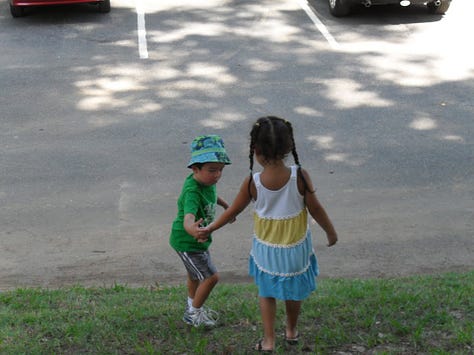
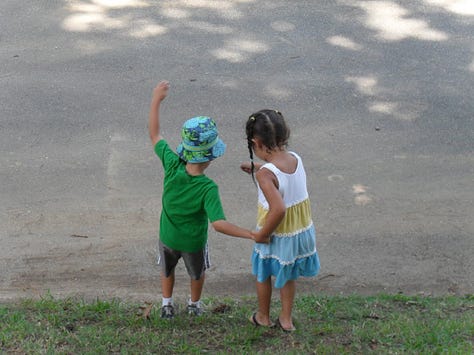
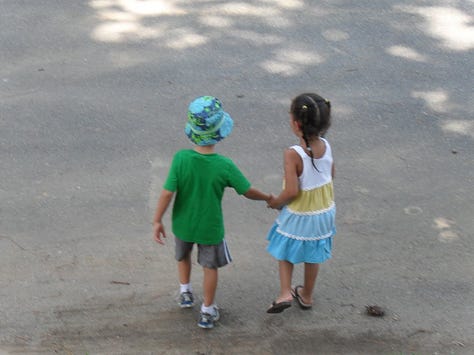
I. The Most Beautiful Neighbor
This summer a beautiful person in our neighborhood died. Her name was Jan. She had been ill, but her death still came suddenly. My wife and our boys went to her funeral, and there was an outpouring of grief, but there was also a spirit of celebration of her kindness and care. She was one of those good, truly good people who seem to hold everything else together. Jan and her husband raised their children on our street, and I knew her for the past ten years as the grandmother who spent her days caring for her many grandchildren, and caring for her aging mother-in-law, and caring for neighbors, even us.
I met Jan at the bus stop on mornings as we waited for the bus to come. She slowly walked up to the bus with her grandkids, pushing the youngest in a stroller. Jan knew everything about the bus routes and schools because she had worked for many years as a school bus driver. We talked about the neighborhood, about our kids. She always exuded a feeling of weary kindness, a long enduring love that you see in mothers and grandmothers when they have many children to care for, many boys and girls who are lively and wild and who fill us with worry as much as with joy. Jan was like a deep steady heart, beating for those she loved, and her big family felt safe and at home in her love. I felt sometimes like the whole street depended on her, that quiet commitment and goodness.
῀
There is an emptiness on our street now.
II. The Thirty-Six
There is a Jewish story that tells of the Tzadikim Nistarim, or the “hidden righteous ones.” There are thirty-six good and holy people upon whom the fate of the earth rests. It is because of their goodness that God spares everyone. But their identity is secret – no one knows who they are. And in some telling of this story, even they do not know that so much depends on them. Such is their humility. They live and work in secret, and thus save the world.
III. Fr. Larry Craig
In my early twenties I worked for a guy named Fr. Larry Craig at Assumption BVM Parish in Chicago. Fr. Craig had been the pastor there for many years, and was also the founding director of Kolbe House, the jail ministry. I worked part time at the parish in youth ministry, and part time as a chaplain in the jail.
It is hard to adequately describe Larry Craig. Gruff. Colorful. Sharp. Dry sense of humor. Quick-witted. Weary. Brutally honest. Faithful. Holy. He had shoulder-length grizzled grey hair. He smoked a pipe and wore jeans around the rectory. He had been at Assumption and Kolbe House for fifteen years when I had met him, and he had been ministering in the jails for over thirty. He was the closest thing I have met to a Zen master – somehow deeply compassionate and yet intimidating at the same time. I loved talking to him but was usually a little nervous. He always gave you some pithy little critique or piece of advice, or just smirked and shook his head at your foolishness.
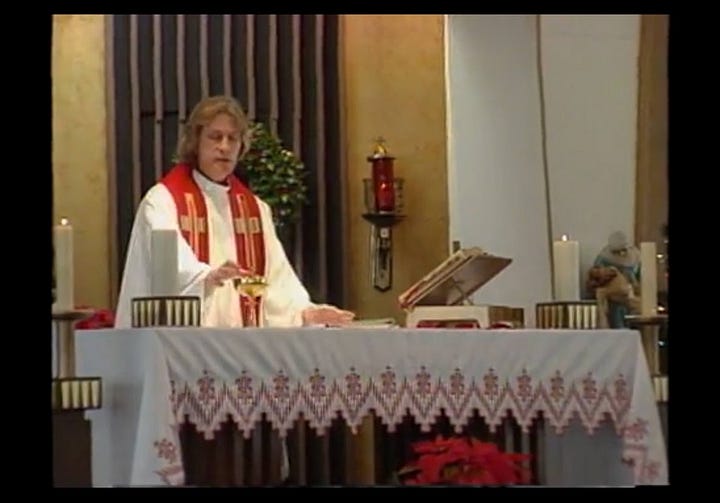
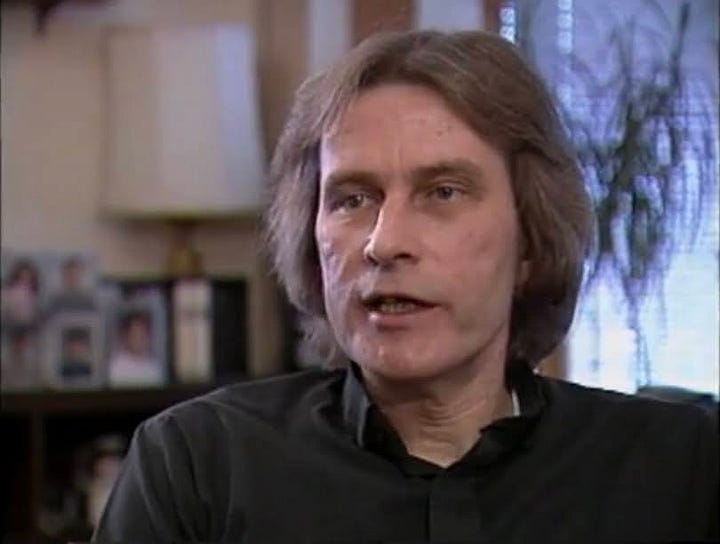
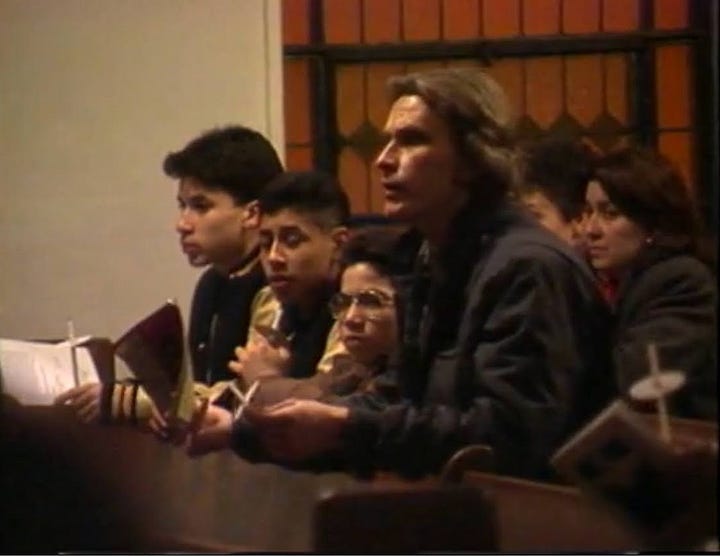
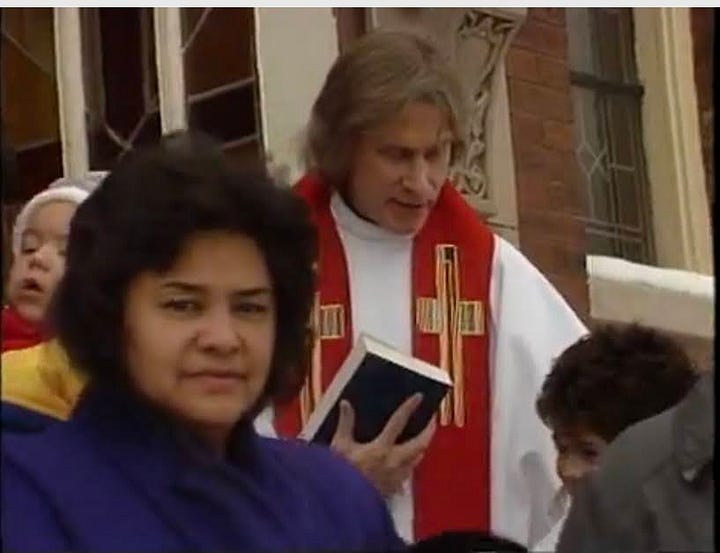
Once I brought a friend to talk with him about a young man she was working with, whom she was afraid was going to join a gang. He looked at me and asked, “You don’t have enough problems of your own?”
Once he gave a homily about how we all needed to put more into the collection, and he held up a “peep-show” token that someone had accidentally dropped in. “Do I need to translate?” he asked the mainly Mexican community. “El Peep Show?” Everyone laughed. “This is what happens when you pull out loose change. You should use an envelope instead… Oh, and if you want your token back, you can see me after Mass.”
In the years before I knew him, Fr. Craig had made the rectory a home for boys who were in trouble and had raised them through their teen years. He coached them in sports and paid for them to go to local Catholic schools with his own money. His house was on the corner between rival gangs, and his parish included Cook County Jail. He had presided over the funerals of young people, but also weddings. On Friday’s he led benediction and adoration, and during Lent he covered all the statues in the church with black cloth. In my mind, he combined in a powerful way traditional Catholic prayer and piety with a no-nonsense streetwise faith and an utterly honest outlook about the world and people. It was urban American Catholicism at its best. He was part of the neighborhood. He knew everyone. He had baptized most of them. Nothing surprised him. He knew what poverty and violence looked like. Felt them. But he was not a cynic. Humility. Humor. The little children in the parish flocked to him for hugs after Masses on Sunday. He smiled, talked to them in his deep, grumpy sounding voice. His faith was gritty, tough, tender, and enduring.
I remember he came to my wedding. He was just sitting in the crowd, with everyone else. I didn’t see him until I noticed him coming down the aisle for communion with everyone else. He gave me a slight nod.
He died very suddenly in 2006 of an aneurysm. He went to bed one evening, and never got up. He was fifty-nine years old. His entire adult life had been in service to people in the jails, and in Humboldt Park and Little Village. At the funeral, when his coffin was lifted to be carried out of the church, the people applauded. They reached forward to help carry his body from the church, weeping and clapping for this man they loved.
῀
Over the past two decades, Larry Craig has become something of an icon for me. The intensity of his person – the clarity and complexity of who he was – communicates something of Christ to me in a way that is hard to explain. He died just before I moved from Chicago, and his death seemed to mark the end of my time there.
He once told me that when you are a pastor, and you are sent to a new parish, you should wait two years before you change anything. It is not yours - it is the people’s parish. Too many priests act like it is their little kingdom, he said. You wait, and listen. You learn.
Another piece of his advice that has never left me.
We were talking in the kitchen of the rectory. He was smoking his pipe, and just rambling on, which he sometimes did. I must have been asking about some program, or some idea, or some new community organization. I can’t quite remember what made him respond to me, but I have always remembered the response.
“The only thing that changes people in the end is a loving community. The love of real people is the only thing that can heal us.”
That might be the thing I believe most in the world.
IV. Wrapped in Swaddling Clothes
The theologian Jack Shea recently described the Christmas miracle in this way:
“A baby is wrapped in swaddling clothes and is laid in a manger. What do the swaddling clothes mean? It means that the child is loved. Someone loved that child, and wrapped him up because they loved him. And because he was loved, he became food for the world.”
One of the ways we talk about what happens at Christmas is to speak of the incarnation – literally the embodiment, or the enfleshment of God. God became present to the world in a physical way through the coming of Christ. We use this word to talk about the ways people embody certain virtues or vices – “that person is beauty incarnate,” for example.

But I love this image of swaddling clothes. This is not an ancillary detail. It is not a sidebar. This is how God comes into the world. This baby – chosen and brought to birth in a difficult world by people who were not ready for him. And they loved him. And they changed their lives and took risks and left their homes so that he could live and be safe.
It is through this determined love that God breaks into our lives.
V. Gwendolyn Brown
Twenty six years ago, I met a boy named Devon. I was working at Holy Rosary in Roseland on the south side of Chicago. It was a tough neighborhood, and he was a wild, tough kid. He would hang around the church after school and come and knock on the door and ask me if he could hang out. I would sit in the office and we would have coffee and he would chatter about his day, about TV, about money, about anything.
Devon lived in foster care with a woman named Gwendolyn Brown. He had been in foster care most of his life. Gwen was the teacher’s aid at the local school where she met Devon. She was also a member of our parish at Holy Rosary. When I met her, she must have already been in her late 50s or early 60s. She had raised children of her own, and her son Tyrone was older than I was. She seemed worn and tired. But somehow, when it was needed, she took in Devon.
Devon was about as a wild a child as he could be. He was smart and energetic and always in trouble. Gwen lived in an old home near the school on a very rough block. I would drive Devon home after youth group and confirmation class and drop him off in front of his house, and he would have to walk through a crowd of young men on the corner. I remember Gwen calling me one night because Devon did not come home. She asked me to come and look for him, that she was worried that he was out with those older men who were trouble. Her voice shook with tears.


When he was a little older, the state put Devon in a group home, and I used to drive Gwen up on Sundays to visit him. It was about an hour drive from 113th St. up to the north side where he was staying. We drove up the Dan Ryan Expressway, passed the towers of public housing, which are now gone , through the downtown, to where Devon was living. Gwen would talk to me about Chicago, about the projects, about her neighborhood, about her son. She told me about the other foster kids she had care for. I would play her my music – Bruce Springsteen and Van Morrison and Counting Crows. She shook her head, laughed and told me that Adam Duritz sounded like a human trombone. Her patience and gentleness seemed endless.
I remember coming to her house one night in the winter when her heat had been turned off. She was wearing a winter coat inside and you could see her breath in clouds in the living room. She was piling up blankets on Devon’s bed – a mattress on the floor.
How many times did she call me because the police had picked up Devon? Or because she was worried he was holding money for the dealers on the street? How many days did we sit in court with him? Or post bail for him? The endless way she loved him like a grandmother, like a mother. Even her anger was filled with love.
When the state took him from her, she stayed his mother. I remember how she dressed up for his eighth grade graduation, and we drove up and took him out for lunch. I remember her sitting with him at my wedding dinner, as she watched everyone dance.
I think about the thirty-six hidden righteous people who hold up the world, and I think of Gwen Brown. She faced a world with so many things that made it impossible to love. Poverty and racism. Drugs and guns and young men with no hope. And yet she loved. She loved that kid who did his best get people to give up on him. And she never gave up.
When I talk to Devon today, he still calls her his mother.
The best she could, she wrapped him in swaddling clothes and laid him in a manger. Hers was a heart that never let him go.
῀
We can be tempted to believe that the most glamorous, or quick, or powerful ways to live are the most important. There is a temptation to believe that the most important thing is to have the right ideas, the right arguments, the right policies. We can be tempted to think there is some ultimate way to fix things so that we will not have to care anymore.
But the truth of human living is that there is no answer to human life that does not involve care and love. And the most important thing is care. Love made incarnate.
Gwendolyn Brown may have seemed to live an obscure life. She lived and loved with mostly poor people, worked as a teacher’s aid and then lived quietly in an apartment in her later years. She watched the boys she had fostered and loved go to prison, and another was murdered. When she died, did many remember her?
But I think it is precisely people like Gwen who are holding the world together. We are kept from the precipice by such lives is hers.
We can be tempted or distracted by lives of public acclaim. We can think what matters most is how we present who we are. And most foolishly, we can think our greatest power lies in our ability to harm someone else, to take a life. To choose another human being as the problem and then wipe them from the Earth.
But in the eyes of God, those are the smallest things. In God’s eyes of those are not real powers.
Where God is really present – it’s through these lives, hidden lives of profound love and care. Enduring, and unglamorous, challenging care. Even in the lives of those those who are great – it is their great love that matters. A love that changes diapers, and cleans up rooms, wipes tears, and wraps bandages, that endures the foolishness of young people and the bitterness of the elderly. The love that sees someone who is lost and says this will be your home now.
God handed his son to two human beings, and they wrapped him in swaddling clothes and laid him in a manger. They gave him this greatest gift - enduring faithful love.
And the word was made flesh and dwelt amongst us.
We may get the privilege of doing this only once or twice in our lifetime. It may be with a friend, or a child, a student or a coworker. It might be a prisoner, or a stranger, or someone on the streets. When you see it, pay attention to it. When you see your neighbor caring for her grandkids, or a foster mother with her wild foster son, or a priest praying and preaching, and trying everything he knows to keep kids alive and growing. This is where God is becoming real.
In all the many ways we need help, and in all the ways we need to think about the problems we have to solve, remember the words of that cranky wise priest. The thing that changes us is a community of love. The love of real people is the one thing that can heal.
For Reflection:
Who is someone that you know that embodies this kind of real, enduring love? How might their love and commitment evoke a deeper understand of God in your life?
How are you being called in your life now to practice this kind of deep and enduring love?
Resources:
“It's funny: I always imagined when I was a kid that adults had some kind of inner toolbox full of shiny tools: the saw of discernment, the hammer of wisdom, the sandpaper of patience. But then when I grew up I found that life handed you these rusty bent old tools - friendships, prayer, conscience, honesty - and said 'do the best you can with these, they will have to do'. And mostly, against all odds, they do.”
― Anne Lamott, Traveling Mercies: Some Thoughts on Faith
“Those Winter Sundays” by Robert Hayden
Sundays too my father got up early and put his clothes on in the blueblack cold, then with cracked hands that ached from labor in the weekday weather made banked fires blaze. No one ever thanked him. I’d wake and hear the cold splintering, breaking. When the rooms were warm, he’d call, and slowly I would rise and dress, fearing the chronic angers of that house, Speaking indifferently to him, who had driven out the cold and polished my good shoes as well. What did I know, what did I know of love’s austere and lonely offices?
from The Pedagogy of Conflict by Pádraig Ó Tuama
III When I was a child, I learnt to count to five one, two, three, four, five. but these days, I’ve been counting lives, so I count one life one life one life one life one life because each time is the first time that that life has been taken. Legitimate Target has sixteen letters and one long abominable space between two dehumanising words.
“But the final word is love. At times it has been, in the words of Father Zossima, a harsh and dreadful thing, and our very faith in love has been tried through fire.
We cannot love God unless we love each other, and to love we must know each other. We know Him in the breaking of bread, and we know each other in the breaking of bread, and we are not alone any more. Heaven is a banquet and life is a banquet, too, even with a crust, where there is companionship.
We have all known the long loneliness and we have learned that the only solution is love and that love comes with community.
It all happened while we sat there talking, and it is still going on.”
― Dorothy Day, The Long Loneliness


